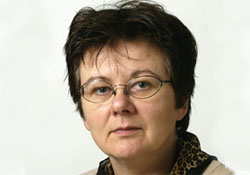I study animal and foodborne zoonotic pathogens

Interview with Joke W. B. van der Giessen, Epidemiologist at the National Institute for Public Health and the Environment (RIVM) Centre for Zoonoses and Environmental Microbiology in the Netherlands
My work focuses on studying animal and foodborne zoonotic pathogens and the transmission risks to humans. Toxoplasmosis is not a notifiable disease in most countries in the European Region, so no real surveillance data are available. Most of the information we have come from research projects and expert opinion. In the Netherlands, we perform a cross-sectional population-based study every 10 years to check the immune status against certain infectious diseases covered by the National Vaccination Programme (RVP). We are currently collecting new data, but in 2006 the seroprevalence of Toxoplasma gondii in the general population was 26%. In 1996, prevalence was 40%, so there has been a significant decline in seroprevalence in the Netherlands.
Food animals less exposed to soil contamination
Exposure to Toxoplasma gondii might be declining in some areas of the European Union due to changing animal husbandry practices. The decrease in seroprevalence is possibly linked to food animals being kept indoors, which decreases their exposure to Toxoplasma gondii oocysts via soil contamination. In that case, transmission via meat of animals kept indoors might be lower. However, there are also other transmission routes to humans, such as fresh produce contaminated by oocysts shed by cats in the environment.
In the Netherlands, we focus on preventing women from acquiring toxoplasmosis during pregnancy by giving information rather than screening. This includes recommending that pregnant women not eat or handle raw and undercooked meat, avoid cat faeces in litter boxes or the environment, and always wash uncooked fruits and vegetables. The effectiveness of treating a baby during pregnancy is unknown. Treatment will not stop transmission to the child, but possibly reduces the long-term consequences.



